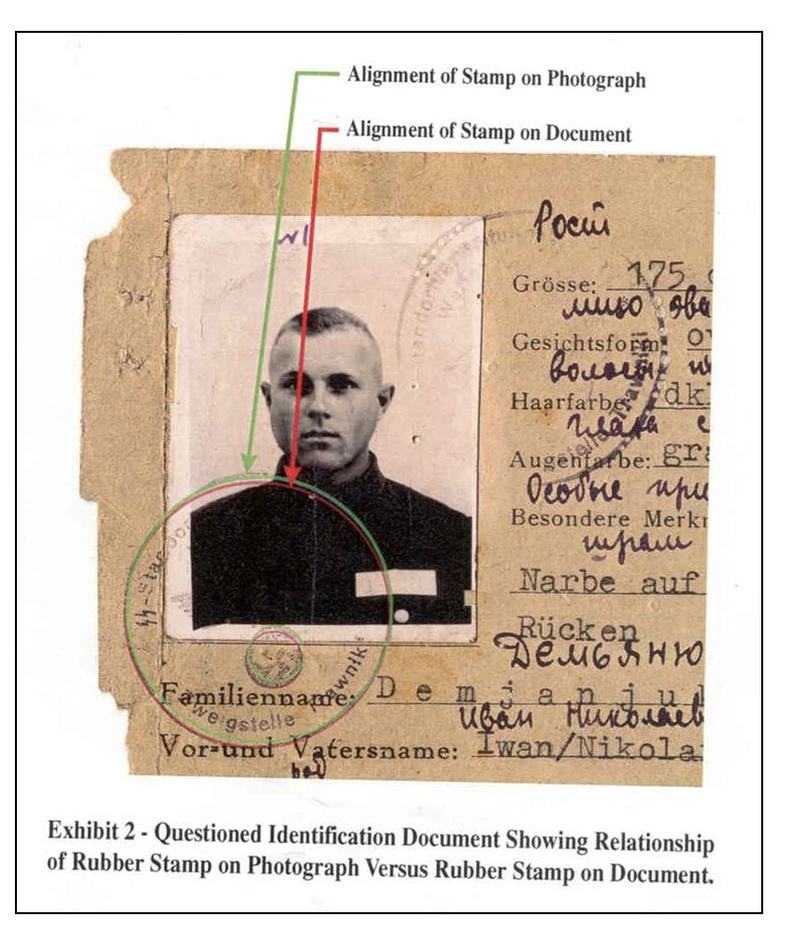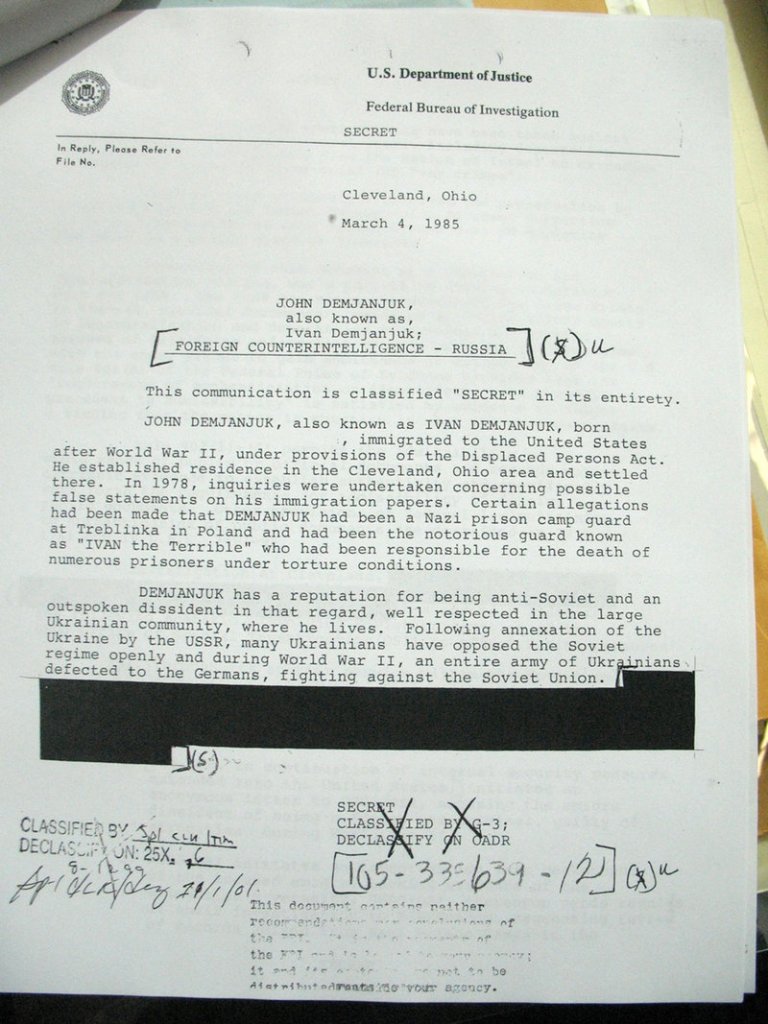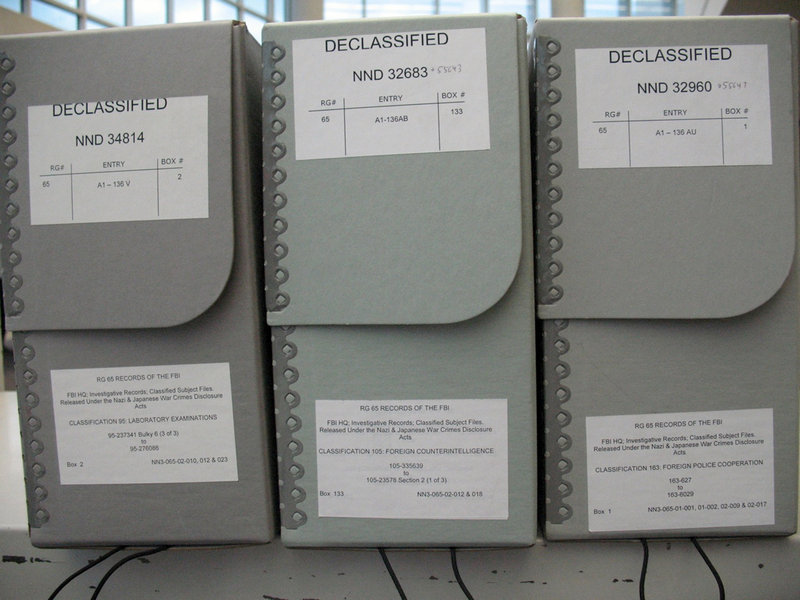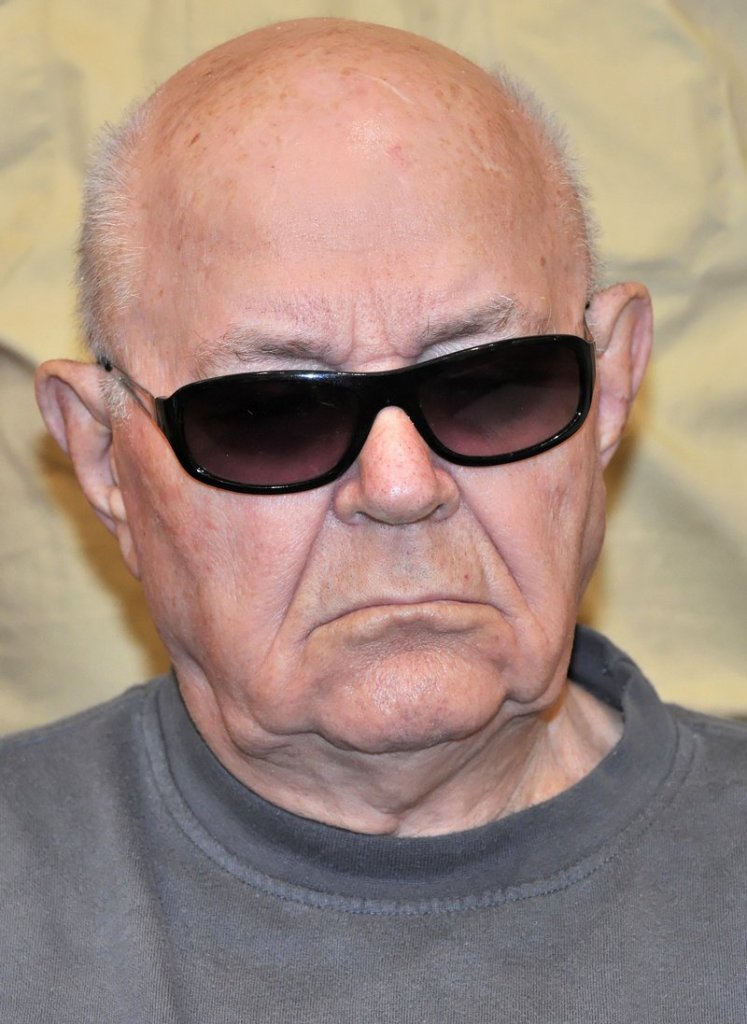BERLIN — An FBI report kept secret for 25 years said the Soviet Union “quite likely fabricated” evidence central to the prosecution of John Demjanjuk – a revelation that could help the defense as closing arguments resume today in the retired Ohio auto worker’s Nazi war crimes trial in Germany.
The newly declassified FBI field office report casts doubt on the authenticity of a Nazi ID card that is the key piece of evidence in allegations that Demjanjuk served as a guard at the Sobibor death camp in occupied Poland.
Throughout three decades of U.S. hearings, an extradition, a death sentence followed by acquittal in Israel, a deportation and now a trial in Munich, the arguments have relied heavily on the photo ID from an SS training camp that indicates Demjanjuk was sent to Sobibor.
Claims that the card and other evidence against Demjanjuk are Soviet forgeries have repeatedly been made by Demjanjuk’s defense attorneys. However, the FBI report provides the first known confirmation that American investigators had similar doubts.
“Justice is ill-served in the prosecution of an American citizen on evidence which is not only normally inadmissible in a court of law, but based on evidence and allegations quite likely fabricated by the KGB,” the FBI’s Cleveland field office said in the 1985 report, four years after the Soviets had shown U.S. investigators the card.
It was the height of the Cold War at the time, and the ID card from the Nazis’ Trawniki training camp had not been as closely examined by Western experts as it has been today.
Since then it has been scrutinized and validated by courts in the United States, Israel and Germany – though experts at the current trial left room for doubt, with one conceding that a counterfeiter with the right materials could have forged the card and other documents.
The FBI agents argued that the Soviets had an interest in faking the documents as part of a campaign to smear anti-communist emigres. Those conclusions contradict the findings of another branch of the Department of Justice, the Office of Special Investigations, or OSI, which was in charge of the overall Demjanjuk probe.
A quarter-century later, Demjanjuk, now 90, is standing trial in Munich on 28,060 counts of accessory to murder, which he denies. A verdict is expected within a month.
The AP discovered the FBI report at the National Archives in College Park, Md., among case files that were declassified after the Ukrainian-born Demjanjuk was deported from the U.S. in May 2009 to face trial in Germany.
It had not previously been seen by defense attorneys in Demjanjuk’s trials in Germany, Israel or the United States, and German prosecutors also were unaware of the document. It is unclear whether prosecutors in the U.S. and Israel knew about it.
The FBI report was among more than 8 million pages of records by federal agencies that were transferred to the National Archives in 1998 under the Nazi War Crimes Disclosure Act. However, the field office report was excluded from public view by the OSI, which was exempted to protect ongoing investigations and prosecutions. The AP learned late last year that partially redacted Demjanjuk files had been opened up, and recently reviewed them.
Neal Sher, OSI director from 1983 to 1994, called the Cleveland report “replete with errors that completely undermine its credibility.” He said in an email that “great care was taken to authenticate any documents” and not one was found to be forged.
But others involved in the U.S. case say it was a key piece of evidence about which they were previously unaware.
Russell Ezolt, the top lawyer for the U.S. Immigration and Naturalization Service in Cleveland at the time, said the report could have influenced the outcome of Demjanjuk’s denaturalization trial.
“I never saw that,” he said in a telephone interview. “This was the key bit to the trial. … If you take away his ID card as a guard, what’s left?”
Since no known eyewitnesses can place Demjanjuk at Sobibor, the case largely revolves around Nazi-era documents captured by the Soviet Union and provided to American, Israeli and now German authorities.
The March 4, 1985, report, on FBI letterhead and marked “SECRET,” says the Cleveland office’s investigation “strongly indicated” a Soviet scheme to discredit “prominent emigre dissidents speaking out publicly and/or leading emigre groups in opposition to the Soviet leadership in the USSR.”
In dismissing the claim, former OSI director Sher said Demjanjuk was not an “outspoken dissident” but kept a low profile. He said the first U.S. judge to rule on the case, as well as an appeals court had declared they believed the ID card was authentic and reliable.
Norman J.W. Goda, one of two main historians to review the vast volumes of material from U.S. investigations of Nazi war crimes declassified since 2001, suggested both the FBI and OSI could be correct: The Soviets could have used the evidence for its own purposes, but it could also be genuine.
“The Soviets did, in fact, use war crimes cases for propagandistic effect, but it was often the case that Moscow provided valid information as well,” said Goda, of the University of Florida.
Demjanjuk’s defense attorney in Germany, Ulrich Busch, said German investigators have received 100,000 pages of Demjanjuk-related documents from the U.S. for the trial, which began in November 2009, but the FBI report was not among them. He plans to petition the court to introduce it as evidence.
“It’s completely new,” he said.
He noted as particularly important the way the FBI said the KGB presented evidence to the U.S. Department of Justice: allowing the material to be viewed only at a Soviet embassy or consulate but not examined by document experts.
“It’s very explicit, and the same thing happened here,” Busch said, noting he could view two Russian-held Nazi “transfer lists” from 1943 only at the Russian Consulate in Munich. The documents indicate a guard named Demjanjuk was sent to Flossenbuerg concentration camp and to Sobibor.
“The Russians said we could look at them but that we couldn’t do anything with them, couldn’t examine them, and then they took them away,” Busch said.
The defense has argued throughout the trial that the ID card is a clever fake, noting that Demjanjuk’s height and eye color don’t match and alleging there are indications the photograph was taken from old identity papers and glued to the card.
The lead prosecutor in the German case said he also was unaware of the FBI report, but said he has no doubts about the evidence. Hans-Joachim Lutz acknowledged the ID card was only shown – not turned over – to American investigators at the time of the 1985 report, but said court experts in Israel and Germany later obtained access to the original, and testified that they believe it to be genuine.
“Now it has been determined to have been genuine, so for us 1985 is relatively uninteresting,” he said.
Send questions/comments to the editors.






Success. Please wait for the page to reload. If the page does not reload within 5 seconds, please refresh the page.
Enter your email and password to access comments.
Hi, to comment on stories you must . This profile is in addition to your subscription and website login.
Already have a commenting profile? .
Invalid username/password.
Please check your email to confirm and complete your registration.
Only subscribers are eligible to post comments. Please subscribe or login first for digital access. Here’s why.
Use the form below to reset your password. When you've submitted your account email, we will send an email with a reset code.